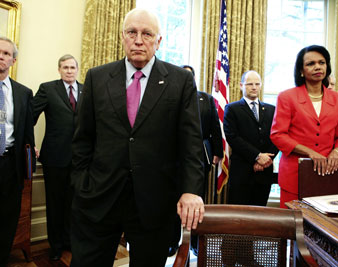 Reuters Photos
Reuters Photos
Dick Cheney and senior Bush administration officials in June 2008.
Robert Scheer is the editor of Truthdig, where this article originally appeared. His latest book is The Pornography of Power: How Defense Hawks Hijacked 9/11 and Weakened America(Twelve).
In the end, the shame of Vice President Dick Cheney was total: unmitigated by any notion of a graceful departure, let alone the slightest obligation of honest accounting. Although firmly ensconced, even in the popular imagination, as an example of evil incarnate–nearly a quarter of those polled in this week’s CNN poll rated him the worst vice president in US history, and 41 percent as “poor”–Cheney exudes the confidence of one fully convinced that he will get away with it all.
And why not? Nothing, not his suspect role in the Enron debacle, which foretold the economic meltdown, or his office’s fabrication of the false reasons for invading Iraq, has ever been seriously investigated, because of White House stonewalling. Nor will the new president, committed as he is to nonpartisanship, be likely to open up Cheney’s can of worms.
Cheney has even had a pass on torture, the “enhanced interrogation” policy that he initiated in his first months in office. “Was it torture? I don’t believe it was torture,” he told The Washington Times on Monday, a week after the release of a unanimous Senate report concluding that the policies Cheney initiated indeed were responsible for torture. In fact, the Senate committee concluded that the model for the Cheney-Bush interrogation policy was the torture practices of the Chinese communists during the Korean War. But it’s not torture when the US president does it, according to the legal judgments that Cheney’s chief counsel, David Addington, pushed through the administration.
Fortunately, Cheney’s view of the unquestioned unitary power of the presidency was scorned by Vice President-elect Joe Biden: “His notion of a unitary executive” Biden said, “meaning that, in time of war, essentially all power, you know, goes to the executive I think is dead wrong.”
Popular
"swipe left below to view more authors"Swipe →
With Biden occupying Cheney’s old office and presumably his secret bunkers as well, maybe we will, at last, learn a bit more of the nefarious truth about the man. One place to start is with the statement of retired US Army Col. Larry Wilkerson, who was Colin Powell’s chief of staff and who stated unequivocally that Cheney was the primary author of the torture policy: “There’s no question in my mind where the philosophical guidance and the flexibility in order to do so originated–in the vice president of the United States’ office.”
That lame-duck Cheney was bellowing his claim of innocence in a series of friendly interviews should have been expected. For he, like the president he served, can use the self-proclaimed “global war on terror” as a convenient cover for eight years of treachery on all fronts: “If you think about what Abraham Lincoln did during the Civil War, what FDR did during World War II; they went far beyond anything we’ve done in a global war on terror.”
Actually, neither of those presidents authorized the waterboarding of prisoners or the other explicit acts of torture approved by this administration largely under the vice president’s direction. But the true absurdity of Cheney’s self-defense is in placing the nebulous war on terror at the same level of threat as the civil war that tore apart this country or the Nazi military machine that rumbled unstoppable across most of Europe, augmented by the military might of Japan.
The invocation of a “global war on terror” is a big-lie propaganda device that has no grounding in reality. The proof that “terrorism” does not exist as an enemy identifiable by commonality of structure, purpose and leadership comparable to the World War II Axis or the Confederacy can be found in its use as a target to justify the invasion of Iraq. An invasion billed as a response to the 9/11 attacks, which had nothing to do with Iraq.
The Bush administration, with Cheney in the lead, did not so much fight the danger of terrorism as exploit it for partisan political purpose. The record is quite clear that the administration was asleep at the switch before 9/11, blithely ignoring stark warnings of an impending attack. But the hoary warmongering after 9/11 afforded a convenient distraction from the economic problems at home. As I asked in a column on June 26, 2002: “Has the war on terrorism become the modern equivalent of the Roman circus, drawing the people’s attention away from the failures of those who rule them? Corporate America is a shambles because deregulation, the mantra of our president and his party, has proved to be a license to steal.”
That is the true legacy of Dick Cheney and the president he ill-served.


